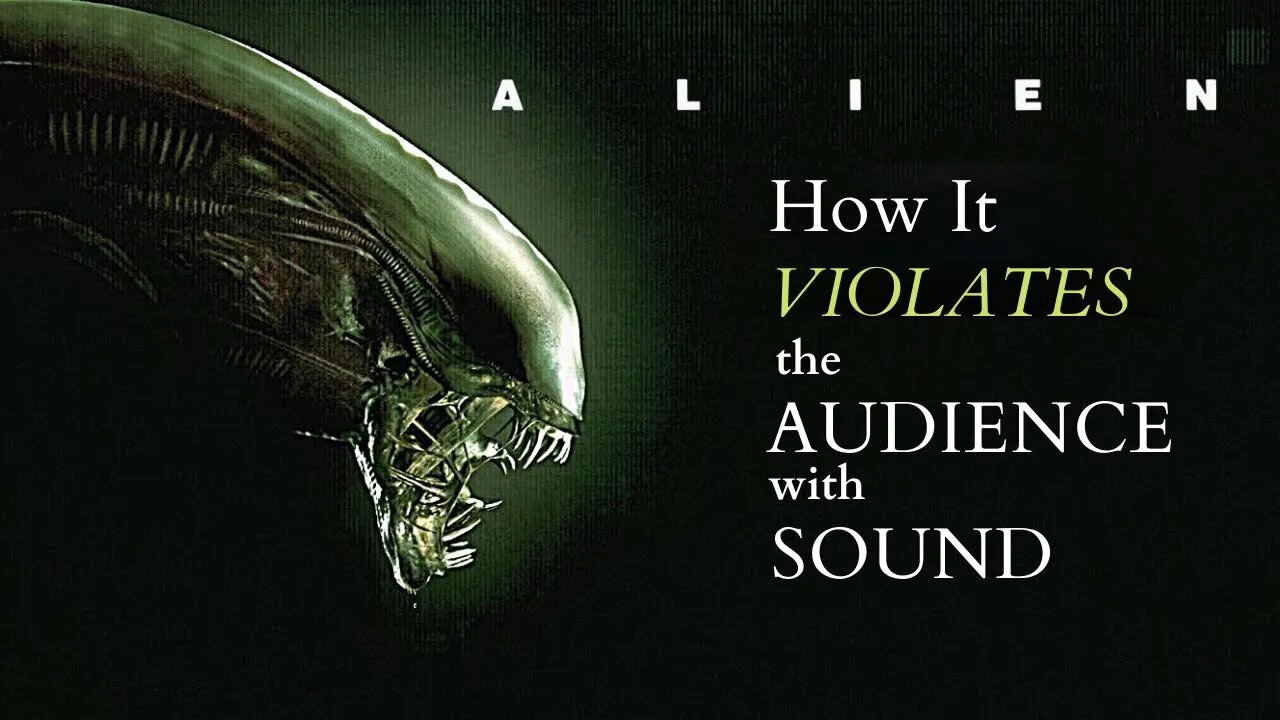Premium Only Content

How ALIEN (1979) Uses SOUND DESIGN to Dismantle Our Humanity | Audio-BioMechanics | An Analysis
In 1979 a film was released that was so terrifying that one might say it took over the bodies of its audience from the inside out, causing people to faint and run from the theater to vomit. That film was Ridley Scott's Alien—a film so iconic that it is hard to believe it almost failed completely. During initial screenings of the film in LA and St. Louis, audiences were lukewarm, viewing the film, it seems, without the hysteria of later audiences. Why the difference? According to filmmakers, it all came down to a problem of sound: the theater speakers were not functioning properly.
This serves to illustrate an important point. Sound is absolutely crucial when it comes to gripping the audience. All of the other factors of the film, be they ever so brilliant or horrifying, fall flat without sound. No matter how terrifying the design of H.R. Giger's xenomorph is, or how revolting its gestation, none of it works if the sound isn’t working.
In this essay, I analyze the sound design of Alien, attempting to uncover what exactly makes it so effective. I hit the following major points.
(1) We are more afraid of what we HEAR than of what we see; sounds from an unseen source terrify us with uncertainty and act as an practical infinity.
(2) Sound is crucial for jumpscares, which rely more on a sudden change in sound than a sudden change in image.
(3) Alien uses sounds from our own bodies (breathing & heartbeats) to get inside our heads, making US the victims.
(4) By blurring the line between organic and mechanical sounds, Alien creates an uncanny effect, confronting us with loss of self, and loss of volition, literally 'objectifying' living beings.
(5) Using Edmund Burke's book A Philosophical Enquiry into the Origin of Our Ideas of the Sublime and Beautiful as a guide, I analyze the self destruct sequence as the auditory climax of the film, containing elements that Burke identifies as creating a 'sublime effect' in the viewer: loudness, sudden silence, rhythmically repeated sounds, and screams of distress.
You may notice that I conclude the essay with a quote from Søren Kierkegaard's pseudonymous work Stages on Life's Way: “…I would rather not have inconvenienced either the professor or the pastor but would rather have heard the howling of the wolves and learned to know God.” It has always stuck with me. It is a powerful invocation of immediacy, as well as a strange but thought-provoking assertion of a connection between 'knowing God' and the experience fear, isolation, and danger: in this case, the experience of SOUND. Make of it what you will.
Alien was directed by Ridley Scott, written by Dan O'Bannon, and distributed by 20th Century Fox. It tells the story of the crew of the Nostromo who, upon encountering a hostile alien life form, fight to survive its deadly onslaught. The film won the Academy Award for best visual effects, and is generally considered to be one of the greatest films of all time, spawning an entire franchise of films, including Aliens (1986), Alien 3 (1992), Alien Resurrection (1997), Prometheus (2012), and Alien: Covenant (2017).
-
 35:56
35:56
Empire of the Mind
2 years agoA CLOCKWORK ORANGE'S Prediction of DYSTOPIAN DEMOCRACY: the Rise & Failure of AUTHORITARIANISM
4412 -
 LIVE
LIVE
The Quartering
1 hour agoElon Musk's 13th Baby, Trump Attends Daytona 500, and Ramaswamy Enters the Ohio Governor's Race
2,724 watching -
 LIVE
LIVE
Dr Disrespect
2 hours ago🔴LIVE - DR DISRESPECT - ELDEN RING DLC - REVENGE
3,668 watching -
 LIVE
LIVE
Russell Brand
1 hour agoBREAKING: UK Troops To Ukraine | Zelensky Wants “Army Of Europe” | JD Vance SLAMS EU Tyranny – SF538
3,661 watching -

Benny Johnson
2 hours agoPANIC: Feds FLEE DC After Mass PURGE, Fired USAID Activists EXPOSED | Trump DOMINATES Daytona 500
36.9K27 -
 LIVE
LIVE
The Charlie Kirk Show
1 hour agoCBS Steps In It + Hockey Brawl + Judicial Standoff | Yoo, Schlapp, BigTree | 2.17.2025
6,629 watching -
 1:01:26
1:01:26
The Dan Bongino Show
4 hours agoTrump Is Cancelling DEI And Cancel Culture (Ep. 2424) - 02/17/2025
485K968 -
 1:06:12
1:06:12
Timcast
3 hours agoDemocrat Swamp IMPLODES, CBS Runs DAMAGE Control For Democrats, Gets ROASTED By Elon | Timcast LIVE
82.9K98 -
 2:00:58
2:00:58
RealAmericasVoice
9 hours agoWAR ROOM WITH STEVE BANNON AM EDITION
60.1K10 -
 2:59:47
2:59:47
Wendy Bell Radio
8 hours agoAmerica Drops The Gloves
66.5K51